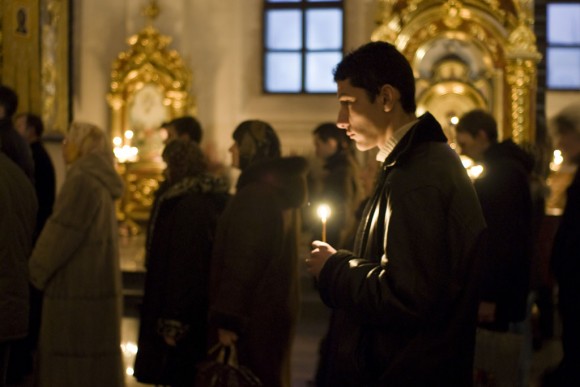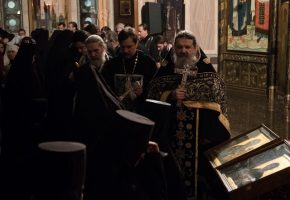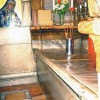I wrote about this before on Pravmir in an article posted in March 2010. So I do not think that there is any need to go over that ground again. I do think, however, that we should have a clear idea in our minds as to why we should fast. At one level it is like any other religious practice, it is a part of Holy Tradition, so we do it. But understanding why is important if we want to engage intelligently with our faith. The simple reason is because asceticism is a vital aspect of Orthodoxy, not just to mark out our faith as different from heterodox forms of Christianity but really as a cutting edge in our spiritual formation and growth. The alternative way is through martyrdom. In other words, becoming like Christ, recovering the likeness as well as the image of God, is costly. Fasting is one way in which we cooperate with God’s grace (synergy).
Last year, there was a television programme presented by Dr Diarmaid McCullough on the History of Christianity. He attempted to sum up the three strands of historical Christianity in the last programme by suggesting that Catholicism was grounded in the Magesterium of the Papacy; that Protestantism was fixed sola scriptura but Orthodoxy it was either ritual or mysticism. He could not have been further from the truth. Yet, somehow, he managed to epitomise the western misconceptions concerning Orthodox Christianity: in place of either ritual or mysticism, he should have said Liturgy AND asceticism. These are the linchpins of our understanding of our faith and they are heightened especially in the practices of the Great Fast.
Is fasting different today?
In essence, no, of course not. That is, if by fasting we understand the true fast. This same question was asked by the prophets of the Old Testament and it was addressed by our Lord Himself in the Sermon on the Mount. We are commanded to fast like anyone who practises religion seriously, only we are to avoid hypocrisy. It is important to remember that no one is saved by religion. Does that sound shocking? It is important to grasp this. We are saved by recovering the likeness of God in Christ, the process we call theosis. Religion is a means to an end; it cannot be an end in itself. Do not misunderstand me – you cannot achieve this without practicing religion but our purpose is not to be religious, it is to come to theosis. Plenty of people on their way to perdition are religious (let alone the irreligious). You can be religious, you can fast, in any religion. Muslims do so in their month of Ramadan; Jews do on Yom Kippur but will this lead to salvation? So fasting is not different today in theory but how we fast will require wisdom in application.
How should one schedule ones life in order to attend more services in Lent?
Well, lets remember that most of us do not live in monasteries and perhaps many of us live quite some distance from our churches, especially here in Britain. But we know that Lent should be demanding. What is to stop us breaking our usual routine, especially in domestic life in order to take advantage of what is on offer in our parish? We might be stuck with our schedule at work but each of us has free time. If work and earning a salary is that demanding of our time, then that is another problem. Naturally, many will have to balance this with the care of children and other, similar concerns. But there is something wrong if, during our week, we cannot find time to attend an extra service. We should not neglect our daily prayers as well. Lent is a good time to reflect on our current practice, if possible with the help of our spiritual father/ mother if we have one – and if not, why not? Time, you see, is a concern in Lent, how we use it; what are our real priorities?
What about foods like Soya that, technically, are fasting foods but mimic non-fasting products?
I would not be too anxious about this question. We must remember that we are not dealing here with food laws, like the Jewish laws of Kashrut in the Old Testament. We are laying aside animal products, especially those that involve the death of animals. We aim, instead, for the foods of paradise but in practice, as you know, shellfish and honey are eaten, so we do not take only from the plant kingdom. If you can do that, well fine, as long as you do not let it be known or judge those who do not. And what if one were to keep the Fast perfectly? Think of the danger from spiritual pride that would nullify your strivings and effort! You might recall, similarly, that passage in the Acts of the Apostles at the Council of Jerusalem where the apostles enjoin on gentiles the ideas of refraining from blood or of eating what was strangled. This was enshrined in the ancient Canons but it would be interesting to know how many Christians are aware of this or abide by it. The apostles seem to imply that the ancient Jewish method of slaughter (Shechitah) should continue to be used by Christians but how many of us buy our meat from a Kosher butcher?
How can one fast from the Internet and electronic devices?
Well, here is a really appropriate modern addition to the Fast. Lets by all means lay these aside as much as practically possible. These have been built into our lives now and they become a necessity. Many of us need them for work but there are social and entertainment uses that we can do without. Try not watching television or only watching what is worthwhile. The problem arises when such things are used to fill the emptiness of much of our modern life. Yes, it would be sad if our life was all work and we could not make time for entertaining ourselves, our families and friends. But Lent is a time for withdrawal, a tactical retreat that makes space for something other. You know, I have a mobile phone but I only ever keep it in my car, turned off. It’s for emergencies or for when I can’t get to a land-line. I never leave it on, ordinarily. It is amazing how addicted people are to them, especially the young. I see people in the street, plugged into devices playing music into their brains whilst I walk along, hearing the birds sing. Strange how atomised people are now, cut off from their natural surroundings in a world of their own devising. Maybe in Lent we might rediscover what God has given us in the natural world as well, what still remains of the paradise of bliss, despite The Fall.
What about fasting under difficult circumstances, in canteens, schools or in mix-families?
The answer, here, is straightforward: do what you can without falling back on the circumstances as a mere excuse for doing nothing. We might recall the teaching of Christ to his disciples when he sent them out to preach the kingdom: eat what is set before you. It is, of course, sometimes possible to bring in your own food, though it is difficult if you are living in an institution. I have been faced with this when, in the past, I taught in boarding schools. Fortunately, I had my own cooking facilities but it was possible to be selective in the school dining hall. Most institutions at least supply vegetarian if not vegan alternatives. The situation within a family must, of course, be handled with sensitivity. As situations can vary so much, it might be best to seek advice in the first place from your parish priest. One does not wish to appear the proverbial spectre at the feast but it is possible to be eating differently without causing friction. We might, though, ask, what is the point of a fast that causes utter disruption?
What are the appropriate venues for almsgiving, charity work and community service?
Our ideas about the world have expanded enormously. What I mean is that, in the past someone’s village or city might be their entire world. Most people grew up where their ancestor’s had. Before the Industrial Revolution, people’s lives would have been much the same ever since the development of agriculture. When it comes to giving alms or serving the community, you would have been confronted by local needs, local poverty, of helping your direct neighbour. We live in a society where many of these direct needs have been handed over to the state and its social provision paid for by our taxes. Most of us, no matter what our political leanings, feel that there is a point when the centralised control of social care is the only way to prevent citizens falling into utter degradation. But the fact that our taxes go towards social support does not deprive us of the duty to give alms. Taxes are forced from us as part of the social contract between the state and the citizen. What we have to consider as Christian people is how we give voluntarily; a way of giving which is both motivated by the love of God for the relief of those who suffer and an ascetic ‘letting go’ of our attachment to possessions, a conquest of our avarice.
Unlike the old world, our world has expanded; technology has introduced us to more information immediately available than people in the past might have acquired in a lifetime. It might be that we have to judge wisely and know exactly what will happen to the money that might give away. Nevertheless, even though there are those who take and abuse the generosity of others, God is aware the selfless heart. Give to the deserving by all means, whether it be through an established organisation or a favourite charity. But we must also be willing to give even to the undeserving as this reflects the very likeness of God who, as the gospel tells us, makes the sun to shine on the good and the bad alike. So, no matter what needs, what suffering in others confronts us, whether abroad or at home, the Great Fast invites us to go the extra mile. Here, there is the need for us to assess and plan for our giving, both for the maintenance of our local church community and to those in need. Remember, though, that what we are aiming at, our endeavour at this season is to advance in Christ: to come to realise that our true treasure are the spiritual realities that we have invested beyond this world.


















